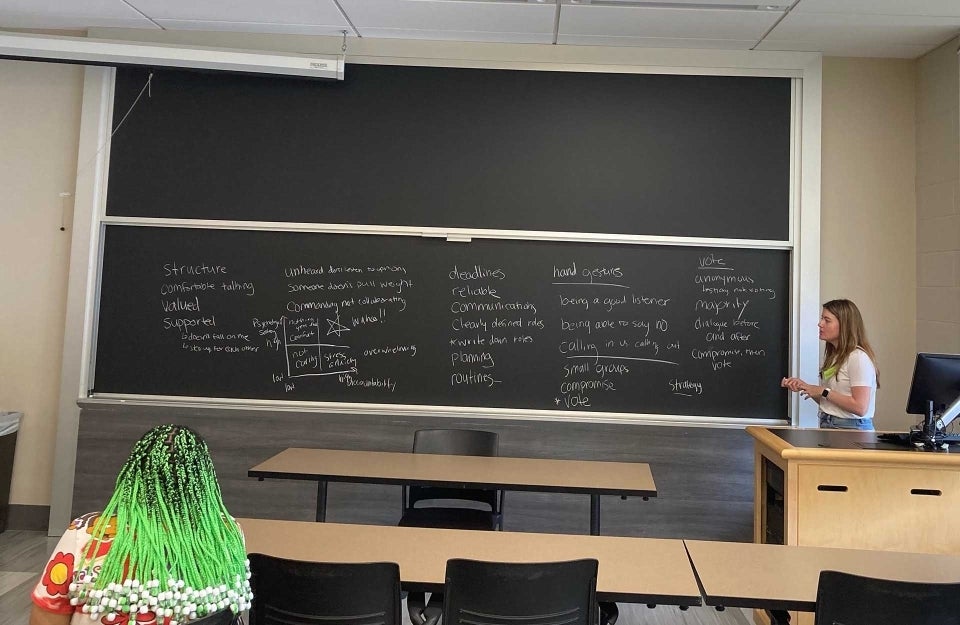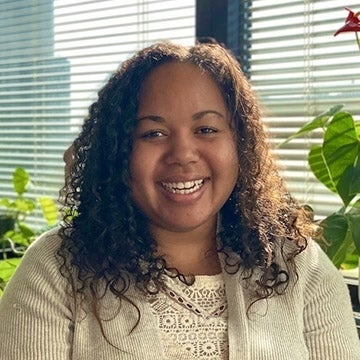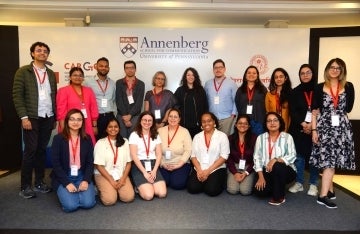Doctoral Students Collaborate With Philadelphia High School Students on Health Communication Research
Thandi Lyew and Brittany Zulkiewicz worked with local teens through a Penn Graduate Community-Engaged Research Fellowship.

Brittany Zulkiewicz talking with students about group dynamics and the process of working together. (photo credit: Thandi Lyew)
Last spring, during a research seminar taught by Professor Andy Tan, doctoral students Brittany Zulkiewicz and Thandi Lyew collaborated with students at West Philadelphia High School to develop public health communication interventions about a topic that worried the teens: sleep, nutrition, and how those behaviors combine to affect mental health.
Using the Youth Participatory Action Research (YPAR) structure, in which young people are trained to become partners in research that will benefit them and their communities, Zulkiewicz and Lyew encouraged students to identify a public health issue that they’d like to address and then proceed to research the best way to address it.
The philosophy behind YPAR research is “for them, by them.” By including young people in designing helpful interventions, the hope is that the resulting solutions will be feasible and acceptable to their target audience.

“Including the community in that process is essential so that we as scientists can make sure we’re developing studies that target what matters to them and in a way that they think would encourage their community to engage with the potential program,” says Lyew.
YPAR research takes time, and the semester went by fast, so after the class ended Lyew and Zulkiewicz applied for a Penn Graduate Community-Engaged Research Summer Fellowship (PGCERM) from the Netter Center to continue their research with the students.
They were awarded the fellowship and soon began spending afternoons with the Penn Netter Center Summer Program interns — high schoolers from around the region. Ironically, this new group of teenagers selected the exact same problem.
“We had to go all the way back to the start,” Lyew says, “but it turned out to be good, because it was a validity check: we had two different cohorts of students — one a little bit more diverse than the other — endorsing the same issues.”
After many meetings, the interns came up with an intervention they wanted to test: a community garden.
“When we asked for the reasons why they thought this would be a good intervention, they gave every single reason I had come up with on my own, and even added ones I hadn't even thought about,” Lyew says. “I was so impressed.”
Students pointed out that green spaces have been shown to reduce stress; that working in a garden can provide physical exercise that will help with sleep; and that selecting a time slot to work in a garden each day can help you develop a routine and better manage your time.

“The students developed a logic model of how a community garden could help those in their community eat healthier and identified creative ways to make healthy eating more feasible through cooking classes, ‘raw’ recipes that require minimal preparation, volunteer programs to reduce the cost of produce, and tailoring available produce and recipes to the community’s preferences,” says Zulkiewicz.
At the end of the summer, the interns gave a presentation about their project to the entire summer program group.
They had designed initial messaging to advertise the garden to peers, including posters.
Lyew encourages her fellow doctoral students to engage in programs like PGCERM and YPAR, as she believes it’s made her a better student, teacher, and scientist, as well as creating more impactful solutions.
“Individuals in the community are the experts on themselves and each other,” says Lyew, “and so their insight on the content and design of the interventions was invaluable for helping to develop a solution that is for them and by them, rather than the usual top-down research development process.”



